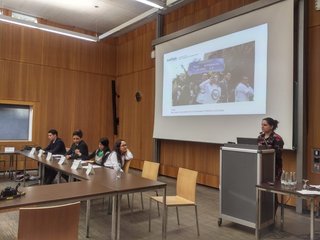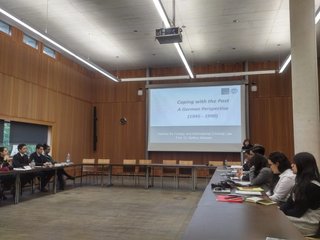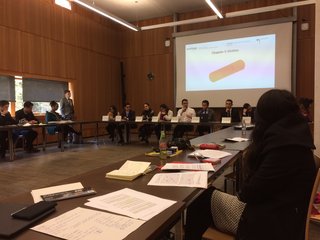On October 17th, the conference „Aspects of Transitional Justice in Colombia” offered first-hand insights into the Colombian peace process. Fourteen Colombian students rendered presentations on various aspects of the armed conflict and its aftermath in Colombia as well as the attempts and measures taken to build peace.
The conference was opened with a brief introduction by Prof. Bettina Weisser, who gave an overview of the German experience and difficulties regarding the question on how to cope with the past throughout the German history since 1945. Prof. Weisser explained the unsatisfying approaches of German courts during that time and the theory of perpetration through an organization (by Claus Roxin) as the most important scholarly invention to properly deal with issues of macro criminality.
The first panel focussed mainly on legal aspects of the peace process in Colombia. As an introduction Pablo Rodríguez Pineda and Pedro León Callejas gave an overview of the transitional justice system and the main mechanisms of the peace agreement concluded in 2016. The second presentation by Humberto Sierra Olivieri, Valentina del Sol Salazar Rivera and Paloma Morales Carillo raised the question whether the Colombian truth, justice, reparation and non-repetition systems meet the standards of the ICC. Following Santiago Espitia Restrepo and Nicolás Otero Álvarez shed light on the problem of criminal liability in the Colombian transitional justice process. To conclude the first penal Laura Arévalo Roldán and Pablo Muñoz Madrid touched upon victims’ rights in the peace agreement.
The second panel in the afternoon had a more interdisciplinary approach to the topic. First Dr. Nathalia Bautista Pizzaro elaborated on the possibility of restauration of law through social models of reconciliation and the role of culture in the transition to peace. During her discourse she also gave insights on “Ubuntu”, a South African philosophy and model of reconciliation. Following, Cristian Salazar Reyes, Sebastián Torres Orozco and Paula Asprilla Arriaga touched upon the possibility of implementing art as a complementary mechanism or as a form of punishment in the Colombian transitional model. Closing the second panel Daniela León, González and Gina Torres López analysed the peace agreement from a gender perspective.
We would like to thank all participants for insightful presentations and fruitful discussions. Our special thanks go to the Colombian students who made all the way from Colombia to share the results of their research with us and tell us about their everyday experience with the reality of the peace process.
Aspects of transitional justice in Colombia
Das Institut für ausländisches und internationales Strafrecht, in Kooperation mit dem Institut für Friedenssicherungsrecht und der Forschungsgruppe Transitional Justice der Universität zu Köln veranstaltet eine eintägige Konferenz zu rechtlichen und kulturellen Aspekten des Übergangssystems in Kolumbien. Zu diesem Thema werden kolumbianische Studenten der Universidad Externado Vorträge zum Friedensprozess in Kolumbien halten.
Um den Jahrzehnte andauernden bewaffneten Konflikt, der über 8 Millionen Opfern forderte, zu beenden, hat die kolumbianische Regierung 2016 ein Friedensübereinkommen mit den Revolutionären Streitkräften Kolumbiens – Volksarmee (FARC-EP) geschlossen.
Das Friedensübereinkommen wurde jedoch von der kolumbianischen Bevölkerung in einer unverbindlichen Volksabstimmung mit einer knappen Mehrheit abgelehnt. Nachdem die umstrittensten Punkte erneut verhandelt wurden, wurde das neue Friedensabkommen mittels mehrere Übergangsgesetze umgesetzt. Die vor kurzem neu gewählte Regierung hat angekündigt, Änderungen des Friedensabkommens anzustreben
Triff Studierende und junge Forscher aus Kolumbien und Köln für diese eintägige Konferenz zum Friedensprozess in Kolumbien.
Für Interessierte an einem Studium im spanischsprachigen Ausland findet, in Zusammenarbeit mit dem Zentrum für Internationale Beziehungen, am 18. Oktober um 10 Uhr im Seminargebäude (R004) eine Informationsveranstaltung zu Studienmöglichkeiten an der Universidad Externado de Colombia in Bogotá statt.
Programm
The Institute for Foreign and International Criminal Law in cooperation with the Institute for International Peace and Security Law and the Transitional Justice Research Group present a one-day conference on legal and cultural aspects of the Transitional Justice System in Colombia. On October 17th a student’s delegation from Colombia will give insights on the peace process in Colombia.
In 2016 the government of Colombia and the Revolutionary Armed Forces of Colombia – People´s Army (FARC-EP) reached a peace agreement to end the decades-long armed conflict that left more than 8 million victims.
The peace agreement was rejected by a narrow majority of the voters in a non-binding referendum 2016. After renegotiation of the most controversial terms a new peace agreement was adopted and put into place by several transformation laws. The recently elected new government has announced to seek amendments to the peace agreement.
Join students and researchers from Colombia and Cologne for this one-day conference on legal and cultural aspects of the peace deal in Colombia.
If you are thinking about studying abroad yourself, then you might want to get to know about your possibilities to study at the Universidad Externado de Colombia in Bogotá. To this end there will be held an information session in cooperation with the Centre for International Relations (ZIB) on October 18th at 10 am (Seminargebäude Room R004).



